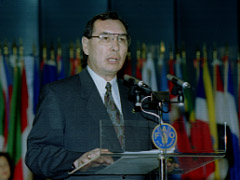


INDIGENOUS PEOPLES' CAUCUS | ||
Mr. J. Wilton Littlechild, Grand Council of the Crees | ||

Thank you very much for this opportunity to address this World Food Summit. My name is Willie Littlechild, a Cree Indian, a Member of the Ermineskin Cree Nation in Treaty 6 of the Territory of Canada. It is an honour for me to present this statement on behalf of my indigenous brothers and sisters, the International Organization of Indigenous Resource Development and the Grand Council of Crees. Food as a basic human right, sustainable food security for all, access to safe and nutritious food, cooperative action and partnership cannot be discussed without the inclusion of indigenous peoples. When one looks at the international concerns of the World Food Summit, the Plan of Action and the seven Commitments, every single aspect impacts on indigenous peoples. When one looks at the problems of poverty, lack of access to lands, water and natural resources; population growth; loss of arable and non-arable lands; migrations and others, every single aspect involves indigenous peoples. When the majority of over 300 million indigenous peoples of the world are among the poorest of humankind, we can no longer be excluded. When one looks at the spiritual relationship with our mother earth, it means indigenous peoples. We are "Inuwak", Peoples of the Land. While we appreciate the efforts of some delegations, we note and draw attention to the very weak references to indigenous people in the Rome Declaration and no reference at all in the Plan of Action, especially when it is the United Nations International Decade of Indigenous Peoples. As indigenous peoples with a right to self-determination, we too have concerns with "food for all". We are concerned that trade is expressed as the key to food security and that emphasis on markets does not recognize indigenous food systems. Non-arable lands or foods from the "wilderness" are not protected for those indigenous peoples who have been harvesters since time immemorial. There are pressures on indigenous peoples not to go to their lands for wild foods, where it still exists, by environmentalists and/or developers. The negative impact of tourist development, land conversions and the food monoculture also erode traditional Indian food systems. The access to lands for traditional foods must be protected. Indigenous peoples have a land-based culture. Food from our mother earth is intrinsically related to our cultural and spiritual way of life. Food is an essential part of many of our spiritual ceremonies. Our religious feasts require certain traditional foods like wild berries and meats, herbs and water. These are integral parts of our culture that are currently impacted or interrupted in many ways. Our ancestors in some areas have secured our traditional ways and food systems in Treaties. These international agreements were signed for "so long as the grass grows, the rivers flow and the sun shines". For sharing our lands, we were to maintain our "vocations of hunting, fishing, trapping" and gathering through certain tracts. We were to be able to do these for food at all seasons of the year. In others, we were to be assisted by Treaty "to be engaged in cultivating the soil" as a right to development. There are other principles in international covenants which state that "Peoples" may not be denied "their own means of subsistence". In conclusion, we would humbly and respectfully urge this World Food Summit to consider some fundamental and positive recommendations for follow-up implementation: First, as you commit to food security for all, where state governments have signed Treaties with indigenous peoples, honour and respect those international agreements according to their original spirit and intent; Secondly, as food is a basic human right and you commit to the promotion and protection of all human rights, then actively support the United Nations Declaration on the Rights of Indigenous Peoples, in particular our right to self-determination as peoples. We acknowledge Canada's recent lead in this regard at the United Nations; Thirdly, as you have committed to access to safe and nutritious foods, then ensure indigenous peoples are returned their dispossessed lands and territories; Lastly, as you commit to cooperative action and partnerships, then ensure indigenous peoples have full and equal participation in decision-making, with informed consent on all matters that directly affect us. | ||
|
|
|
|

 |